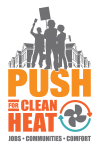What are Air Source Heat Pumps?
An air source heat pump is an efficient option to provide both heating and cooling using electricity. They use less energy than electric furnaces or electric baseboards because they use electricity to concentrate and transfer heat, this transfer is done using refrigerants.
Air Source Heat Pumps are a little more complicated than your fridge, but work with the same principles. Outside, there is a compressor that looks similar to a central air conditioning unit. The compressor has refrigerant circulating inside. This refrigerant absorbs heat in the air and is put under pressure, which heats it up more. It then circulates into your home, where a blower blows air over it, and warm air is distributed into your home. The cycle can also be reversed to provide cooling in your home.
To maintain the efficiency of air source heat pumps, they should be installed well, made for our climate, sized for your home, and installed in a well-insulated home.
Need help determining the heat pump system that might be best for your home?
The New York State Energy Research and Development Authority (NYSERDA) has developed the Heat Pump Planner tool to help you learn more about heat pump technology, the types available, installation and operation costs, and questions to ask an installer.
How It Works: Air-Source Heat Pumps (1:52)
Courtesy of New York State Energy Research & Development Authority (NYSERDA)
Resources
Frequently Asked Questions
- Heat pumps don’t work in cold climates – This used to be the case, but the technology has advanced, and our knowledge of heat pumps has advanced as well. With any new technology, there are kinks to work out. These kinks resulted in a lot of lessons learned.
- If I can’t just swap it with my existing system, its not worth it. – Many homes have comfort issues – rooms that get too hot or too cold, or maybe there are cold spots in your house. With the cost of gas being so low, and the ability of a gas furnace to pump out hot air quickly, many homeowners were able to ignore these uncomfortable spots in their house. By pairing heat pumps with insulation installation or upgrades, as well as air sealing, your home should feel more comfortable and your home will lose less heat. Preventing heat loss is a major part of energy efficiency.
- Heat pumps blow cold air – This was an issue with earlier versions of heat pumps. Variable speed fans, improved technology with the controls and higher heating capacity has improved this problem.
The life cycle of all types of equipment depends on many factors including the brand, installation and maintenance. Generally, air source heat pumps have a life cycle of 15-20 years.
- The cost of heat pumps has been coming down over the years. This is in part driven by increased demand and technology improvements. In order to bring down the cost of this new technology, there are incentives and low cost financing. For those that are income qualified, there is greater financial assistance.
- If you are comparing the cost of an air source heat pump to a gas furnace, the cost will be higher. However, if you compare it to installing a furnace and an air conditioning system, the cost is much more comparable.
Warranties vary by manufacturer but is similar to other heating systems. The cost of regular servicing will vary by technician or company, but is similar to other heating systems.
A load calculation, often called a Manual J (this is a specific type of load calculation) is a software program that your installer can use, or sometimes hires someone to complete. Many of the factors that affect heat use in your home are inputted, including insulation levels, square footage, ceiling heights, type and square footage of windows, doors, and air leakage, to name a few. Using information about the specific climate you live in; the software makes a recommendation for the capacity of the system. It may be an additional fee to have this completed, but it is important to make sure that the system you install has the capacity to heat your home.

